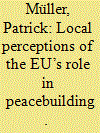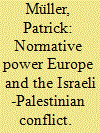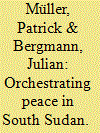|
|
|
Sort Order |
|
|
|
Items / Page
|
|
|
|
|
|
|
| Srl | Item |
| 1 |
ID:
157982


|
|
|
|
|
| Summary/Abstract |
Perception research can make a valuable contribution to the study of the local dimension in EU peacebuilding. The conceptual framework developed in this article distinguishes between perceptions of the “legitimacy,” “effectiveness,” and “credibility” of EU peacebuilding practices, which are crucial factors for successful peacebuilding. Relying on the case of the EU’s support for security sector reform (SSR) in Palestine, this article shows that local stakeholders—which participate in various EU-sponsored training and capacity-building programs—display considerable support for liberal peacebuilding norms. Yet, perceived discrepancies between the EU’s peacebuilding rhetoric and its SSR activities have severely undermined the potential of the EU’s liberal peacebuilding model in the eyes of Palestinian stakeholders. Critical local perceptions are frequently articulated with reference to the EU’s own liberal peacebuilding discourse, pointing to a lack of inclusiveness of the SSR process and deficits in terms of democratic governance and the rule of law.
|
|
|
|
|
|
|
|
|
|
|
|
|
|
|
|
| 2 |
ID:
168954


|
|
|
|
|
| Summary/Abstract |
This article conceives the EU’s normative power in the Israeli-Palestinian conflict as a narrative that projects views of the international system, the EU’s identity as a peacebuilder, and its positions on specific conflict issues. Highlighting the importance of local narratives as cultural filters, this article argues that a high degree of alignment of local narratives with key elements of the EU’s normative power narrative facilitates positive images of the EU as a normative power in peacebuilding, whilst diverging local narratives tend to give rise to more critical views. Yet, the case of Palestine also shows that strong narrative alignment with the EU may encourage high expectations, resulting in critical views about inconsistencies between the EU’s normative aspirations and its actual foreign policy conduct.
|
|
|
|
|
|
|
|
|
|
|
|
|
|
|
|
| 3 |
ID:
171713


|
|
|
|
|
| Summary/Abstract |
Previous research has primarily focused on the EU’s high-profile involvement as direct mediator in peace negotiations. Conversely, less attention has been devoted to the EU’s support to third parties’ mediation efforts, which is a significant component of its mediation activities. Addressing this research gap, this article develops a conceptual framework for the systematic analysis of EU mediation support, identifying key mediation support techniques and the conditions for their success. In terms of mediation support techniques, the EU may rely on “endorsement”, “coordination”, “assistance”, and “lending leverage” to empower and steer third party mediators in line with its mediation objectives and values. We illustrate the utility of the conceptual framework for the EU’s support to IGAD in mediating in South Sudan’s civil war. We find that the EU has contributed significantly to IGAD’s empowerment in terms of endorsement, coordination, assistance, and lending leverage. Simultaneously, our analysis also points to important challenges in the EU-IGAD relationship, which relate to challenges concerning strategic engagement with IGAD’s internal politics that are marked by diverging interests and ties of its member states to the conflict parties.
|
|
|
|
|
|
|
|
|
|
|
|
|
|
|
|
|
|
|
|
|